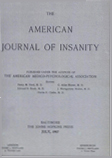REMARKS UPON UNDIAGNOSED CASES, CHICAGO STATE HOSPITAL, 1919
Abstract
1. The undiagnosed cases in institution psychiatry present interesting problems as to diagnosis and prognosis.
2. Many case histories are lacking in clear description of historical facts, conduct disorders, stream of speech, etc.
3. Undiagnosed cases should be followed up most carefully. The average hurried and perfunctory note is only a little better than no note at all.
4. Conclusions without a statement of facts are misleading. Terms such as rambling, confused and violent should be used very cautiously in the primary case record.
5. Undiagnosed cases should be represented as often as new facts discovered will warrant.
6. In a considerable percentage of undiagnosed cases, disagreement and hesitation upon the part of the staff indicate, though oftentimes unwittingly, a good prognosis.
7. Confusion and apprehension in an acute psychosis would seem to indicate dementia præcox more often than any other disorder.
8. The absence of definite hallucinosis in a case otherwise doubtful contributes to failure in classification.
9. There are depressions of psychogenic origin that are not manic-depressive in nature and these types often occur between the ages of 40 and 60 with recovery.
10. The senile-presenile state is uncertain ground. A return should be made to the Kraepelinian presenile grouping.
11. Psychiatry is so far from being an exact science that many cases must be left undiagnosed if the psychiatrist is to retain his self-respect. He can not honestly diagnose them all.
Access content
To read the fulltext, please use one of the options below to sign in or purchase access.- Personal login
- Institutional Login
- Sign in via OpenAthens
- Register for access
-
Please login/register if you wish to pair your device and check access availability.
Not a subscriber?
PsychiatryOnline subscription options offer access to the DSM-5 library, books, journals, CME, and patient resources. This all-in-one virtual library provides psychiatrists and mental health professionals with key resources for diagnosis, treatment, research, and professional development.
Need more help? PsychiatryOnline Customer Service may be reached by emailing [email protected] or by calling 800-368-5777 (in the U.S.) or 703-907-7322 (outside the U.S.).



